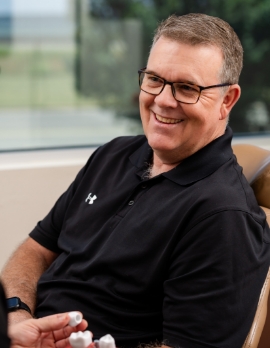May 13, 2024

Medically Reviewed by Dr. Bryce Lamer

After your dental implants fuse with your jawbone and fully heal, you can eat normally and enjoy your favorite foods. But the days and weeks following implant surgery require careful food choices. What can you eat after getting dental implants? We will explain which foods to eat and avoid and why it matters. And you will get five tips to help you stick with the food list.
What Can You Eat After Getting Dental Implants?
After getting dental implants, you will begin with a liquid diet. Then you can progress to eating soft food. But the diet limitations are temporary. After the healing process, you can eat your favorite meals again.
Why Do You Need to Eat Soft Food After Implant Surgery?
After implant surgery, you will need a soft diet to prevent anything from interfering with the healing process. In an International Journal of Oral and Dental Health article on dietary guidelines for implant dentures, researchers noted that occlusal overload (the force or pressure when your upper and lower teeth meet) is a leading cause of implant failure. The study notes the following:
- Diet may influence occlusal forces.
- After implant placement, patients should follow a balanced diet.
- Avoid chewing tough food with implants until at least the twelfth week after surgery.
Hard, sticky, and crunchy food can get stuck in or chip a healthy natural tooth. Understandably, your food choices can affect the stability of new dental implants that have not yet fused with your jawbone. Without a soft diet, food can affect dental implants in these ways:
- Repositioning implants
- Getting stuck between your implants and gum tissue
- Putting too much force or pressure on implants
What Is the Timeline for Eating After Getting Dental Implants?
Throughout the timeline for eating after you get dental implants, choose nutritious foods that promote healing. Also, stay hydrated by drinking plenty of water. You can expect a timeline like this for your soft food diet with dental implants:
- First 24 to 28 hours – Begin with a liquid diet. Drink cool—not icy liquids—but avoid using a straw because the sucking motion can dislodge blood clots at the surgical sites.
- Three to fourteen days – Continue drinking cool liquids. Eat soft food that does not require any chewing. Applesauce, yogurt, protein shakes, broths, and smoothies are examples.
- Fifteen days to twelve weeks – Eat soft food that requires minimal chewing. Choose steamed vegetables and soft fruits. Include soft proteins in your diet, such as beans, flaky fish, or puréed meat.
Foods to Eat After Getting Dental Implants
Eat various soft, nutritious fruits, vegetables, and proteins after dental implant surgery. Suggestions are below:
Fruit
Your fruit choices may include:
- Apples, baked
- Applesauce
- Avocado, ripe
- Bananas
- Mango, peeled
- Melons, without seeds
- Papaya, peeled
- Peaches, peeled
- Pears, baked and peeled
Vegetables
After dental implant surgery, you can eat vegetables without stems or seeds. Steam vegetables, such as these, to soften them:
- Beets
- Green beans
- Green peas
- Seeded squash, including zucchini, eggplant, acorn, butternut, pumpkin, spaghetti, or yellow squash
Meat, Fish, and Other Proteins
Eat plenty of these proteins after getting dental implants to help your body repair tissue and fight infection:
- Broth, stock, or smooth soup
- Eggs
- Flaky fish (non-fried)
- Ground or canned beef, chicken, or turkey
- Hummus
- Legumes – Chickpeas, black beans, kidney beans, and other types of peas or beans
- Protein drinks
- Soft tofu
- Yogurt
Other Foods and Drinks
Other tasty options include:
- Herbal tea
- Mashed potatoes
- Smoothies
Food to Avoid
Avoid food that can irritate your gums or the surgical sites or disturb your dental implants. Also, stay away from food that can break into pieces and get stuck around implants or that creates suction in your mouth.
Examples of food to avoid:
- Acidic – Tomatoes, citrus fruit, vinegar
- Chewy – Taffy, toffee, beef jerky, cheese, pizza, corn on the cob, stringy meat, or meat on the bone
- Crunchy – Nuts, chips, popcorn
- Hard – Fresh apples, carrots, celery
- Hot – Coffee, tea, and hot soup
- Seeds – Soft fruits, such as raspberries and strawberries, have tiny seeds that can get trapped around your implants.
- Spicy – Hot peppers, pepper-based sauces
- Sticky – Licorice, caramel, dried fruit, peanut butter
- Too small – Grains, including rice and some pasta
We also recommend avoiding noodles after surgery as the pasta can get wrapped around your stitches and cause discomfort. We suggest delicious brothy and creamy soups instead.
Thirteen to Sixteen Weeks
In three to four months, your bone and gums will heal, and your jawbone and implant will fuse. Reintroduce nutritious solid food into your diet. Be conscious of whether specific foods seem to irritate your gums or implants. If you feel discomfort, stop eating food that irritates your implants, keep a list of them, and talk to your oral surgeon about the issues.
Food to Eat
Try to add these solid foods back into your diet:
- Dairy – Cheese
- Green leafy vegetables – Spinach, kale, cabbage
- Healthy carbohydrates – Sweet potatoes, oats
- Proteins – Chicken, fish, turkey, ground beef
Food to Avoid
Continue to avoid these foods until your oral surgeon determines they will not irritate or overload your dental implants:
- Acidic
- Crunchy
- Hard
- Spicy
- Sticky
Nutrition Is Essential
Although eating a soft diet can be challenging, be patient with yourself. Maintaining good nutrition is essential to the healing and health of your dental implants. Staying hydrated and eating healthy gives your body the nutrients and proteins your gums and bone need to support your implants. Deviating from your soft diet can put your dental implants at risk.
What can help you stick with a soft diet?
Plan – Keep healthy, soft foods and snacks at home, and take some to go.
- Reward yourself – Celebrate each day or week that you stick to your diet.
- Search for flavorful recipes – Look online for soup, vegetable, fruit, or protein recipes that include the foods you can eat.
- Have fun without food – Talk to your friends and family about planning some social activities that do not focus on food.
- Remember your goal – List the reasons you chose to get dental implants. Adhering to a soft diet and following your oral surgeon’s instructions is worth it to reach your goal. Then you can celebrate with your favorite food.
You Can Trust OKC-OMS for High-Quality Dental Implants
In Oklahoma City, you can get reliable results with dental implants from an oral surgeon at OKC-OMS. During a consultation, one of our surgeons will listen to your concerns, determine if you are a candidate for dental implants, and explain your options. We welcome you to experience our patient-centered care. Contact us for an appointment or find a surgeon near you on the American Association of Oral and Maxillofacial Surgeons’ website.




